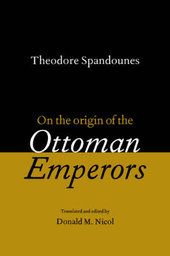
|
Theodore Spandounes: On the Origins of the Ottoman Emperors
Hardback
Main Details
| Title |
Theodore Spandounes: On the Origins of the Ottoman Emperors
|
| Authors and Contributors |
By (author) Donald M. Nicol
|
| Physical Properties |
| Format:Hardback | | Pages:192 | | Dimensions(mm): Height 236,Width 159 |
|
| Category/Genre | World history - BCE to c 500 CE |
|---|
| ISBN/Barcode |
9780521585101
|
| Classifications | Dewey:956.015 |
|---|
| Audience | | Professional & Vocational | |
|---|
|
Publishing Details |
| Publisher |
Cambridge University Press
|
| Imprint |
Cambridge University Press
|
| Publication Date |
24 July 1997 |
| Publication Country |
United Kingdom
|
Description
Theodore Spandounes (or Spandugnino) belonged to a Byzantine refugee family who had settled in Venice after the Ottoman conquest of Constantinople in 1453. He wrote an account of the origins of the Turkish rulers and of their phenomenal rise to power. It was partly a plea to the Popes and princes of western Christendom to unite against the infidel, and was one of the earliest works of its kind. The first version of the book, written in Italian, appeared in 1509 and was translated into French in 1519. The final version was made in 1538, and a full Italian text was published in 1890, though without any historical commentary. This book presents an English translation of the full text with a preface, commentary and notes; a discussion of the sources which Spandounes might have consulted; and an assessment of the value and interest of this hitherto neglected and undervalued treatise.
Reviews"In essence, this is a treatise that was 'partially a plea to the Pope and kings of Western Christendom to unite against the Infidel and oust the Turks from Europe'(p. ix)." Middle East Journal "With this volume, Donald M. Nicol has made accessible a valuable treatise about the Ottoman "other", as presented by an expatriate Byzantine living in western Europe in the first half of the sixteenth century. Anyone interested in the Ottoman Turks, in their interactions with western Europeans, or with western European perceptions of the "other" will want to have access to this volume. It is warmly recommended." James R. Payton, Jr., Sixteenth Century Journal
|